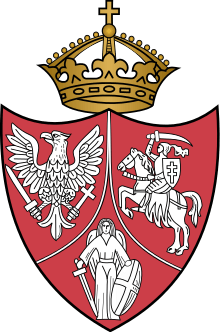Romuald Traugutt
Romuald Traugutt (16 January 1826 – 5 August 1864) was a Polish general and war hero best known for commanding the January Uprising of 1863. From October 1863 to August 1864 he was the leader of the insurrection. He headed the Polish national government from 17 October 1863 to 20 April 1864, and was president of its Foreign Affairs Office.
Before the uprising he was a Lieutenant Colonel (podpułkownik) in the Russian army, where he won distinction in the Crimean War. He retired from the army in 1862 and became involved with Polish nationalists.[1] After leading a partisan unit in the initial rebellion,[1] he became leader of the rebel forces in October 1863.
After the uprising failed, he was sentenced to death by the conservative Russian-orthodox regime of Tsar Alexander II and hanged near the Warsaw Citadel on 5 August 1864, aged 38, together with the rebel commanders Rafał Krajewski, Józef Toczyski, Roman Żuliński and Jan Jeziorański. The Roman Catholic Church is considering his beatification due to his overwhelming devotion to God and sacrifice for his homeland Poland.[2] One of his early biographers has been the Marian Father, Józef Jarzębowski (1897-1964), who devoted three volumes to Traugutt's life and work.[3]
Remembrance
In 1916, a monument was raised in Warsaw on the site of his execution,[4] and in 1925, the area around it was dedicated as Traugutt Park.[5]
In 1945, he was honored on the first postage stamp of the newly re-emerged Republic of Poland as part of a three-stamp set honoring national heroes.[6] He had been earlier honored on a stamp in the 1938 set for the 20th anniversary of Poland’s independence after World War I.[7] Poland issued additional stamps in his honor in 1962[8] and 1963.[9] He was also commemorated on the Polish 20 złoty banknote of the 1980s.
The high school in Częstochowa is named after him, and a memorial column to him was erected in 1933 in Ciechocinek.[10]
Notes
- 1 2 Lerski, Jerzy Jan (editor) (1996) "Traugutt, Romuald" Historical dictionary of Poland, 966-1945 Greenwood Publishing, Westport, Connecticut, pages 609-610, ISBN 0-313-26007-9
- ↑ Kłoczowski, Jerzy (2000) A History of Polish Christianity Cambridge University Press, Cambridge, England, page 222, ISBN 0-521-36429-9
- ↑ Jarzębowski, Józef. Traugutt, nakładem Archidiecezjalnego Instytutu Akcji Katolickiej, Warszawa, 1938.
- ↑ Brandys, Kazimierz (1984) A Warsaw diary 1978-1981 Chatto & Windus, London, page 16, ISBN 0-7011-2903-4
- ↑ Chrościcki, Juliusz A. and Rottermund, Andrzej (11978) Atlas of Warsaw's Architecture (translated by Jerzy Dłutek from Atlas Architektury Warszawy) Arkady, Warsaw, page 226, in Wroclaw a street was named after his name. OCLC 4402354
- ↑ The stamp was issued with a denomination of 25 groszy and is listed in Scott's Standard Postage Stamp Catalogue as Poland #341. "Poland" Scott, volume 5 (2011)
- ↑ The stamp was issued with a denomination of 2 złoty and is listed in Scott's Standard Postage Stamp Catalogue as Poland #331. "Poland" Scott, volume 5 (2011)
- ↑ The stamp was issued with a denomination of 60 groszy and is listed in Scott's Standard Postage Stamp Catalogue as Poland #1062. "Poland" Scott, volume 5 (2011)
- ↑ The stamp was issued with a denomination of 60 groszy and is listed in Scott's Standard Postage Stamp Catalogue as Poland #1111. "Poland" Scott, volume 5 (2011)
- ↑ "History of Ciechocinek" The Official Tourism Website of Kujawsko-Pomorskie Province
Bibliography
- Józef Jarzębowski. Traugutt, nakładem Archidiecezjalnego Instytutu Akcji Katolickiej, Warszawa, 1938.
- Józef Jarzębowski. Węgierska polityka Traugutta: na podstawie znanych i nieznanych dokumentów. Warszawa 1939. ("Traugutt's Hungarian policies").
- Józef Jarzębowski. Traugutt: dokumenty, listy, wspomnienia, wypisy. Londyn: Veritas, 1970.
External links
| Wikimedia Commons has media related to Romuald Traugutt. |
